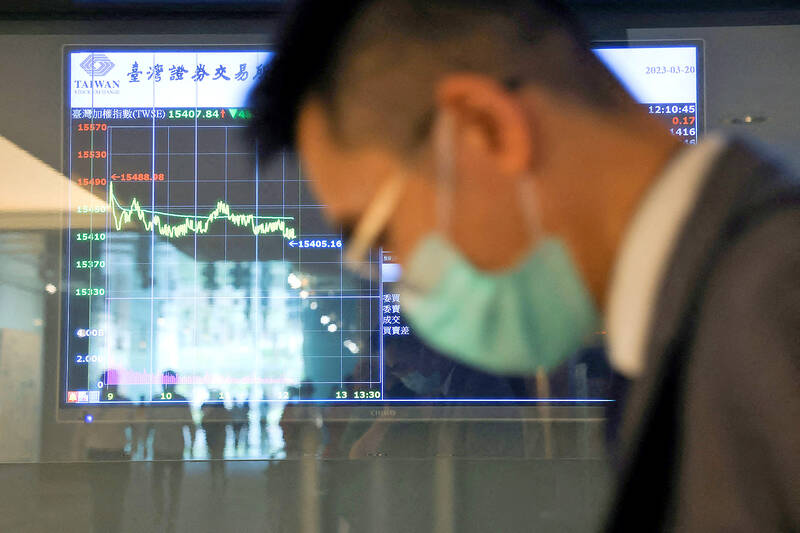Foreign institutional investors in Taiwan registered a net fund outflow of US$5.81 billion last month, when tech stocks on the local market were encountering headwinds, the Financial Supervisory Commission reported on Tuesday last week.
Last month’s figure was the fifth-largest monthly outflow since 2011 and followed the US$4.7 billion in net outflow in July, the commission said.
Securities and Futures Bureau Chief Secretary Shang Kuang-chi (尚光琪) said the massive fund outflow came after the TAIEX plunged about 511 points, or 2.98 percent, as investors locked in profits made on stocks related to artificial intelligence.

PHOTO: REUTERS
Other contributing factors were the hawkish tone struck by the US Federal Reserve at the annual Jackson Hole Economic Symposium, and the financial woes suffered by several major Chinese property developers, which spooked market sentiment, Shang said.
Last month, foreign institutional investors sold a net NT$123.74 billion (US$3.87 billion) worth of shares on the local stock market, a monthly high so far this year, which led to heavy losses on the TAIEX, the commission said.
In the first eight months of this year, foreign institutional investors registered an aggregate net fund inflow of US$13.83 billion on the back of a strong rebound in tech stocks in line with the global markets, commission data showed.
During the same period, foreign institutional investors bought a net NT$90.995 billion worth of shares on the local market, it said.
The aggregate fund inflow registered by foreign institutional investors showed that they remained confident in the local market, Shang said.
As of the end of last month, foreign institutional investors were holding a 38.2 percent share of the combined market capitalization on the main board and the over-the-counter (OTC) market, the commission said.
Listed companies on the local main board and the OTC market generated NT$2.132 trillion in combined revenue in the first seven months of the year, the third highest in Taiwan’s history, despite weakening global demand, high inflation and aggressive rate hikes by major central banks worldwide, according to Shang.
As of the end of July, the average cash dividend yield in Taiwan was 3.53 percent, one of the highest in the world, while the average price-to-earning ratio , which gauges a company’s valuation by measuring its current share price against its earnings per share, was only 16.8, indicating that the Taiwan stock market remained attractive, Shang said.

Nvidia Corp’s demand for advanced packaging from Taiwan Semiconductor Manufacturing Co (TSMC, 台積電) remains strong though the kind of technology it needs is changing, Nvidia CEO Jensen Huang (黃仁勳) said yesterday, after he was asked whether the company was cutting orders. Nvidia’s most advanced artificial intelligence (AI) chip, Blackwell, consists of multiple chips glued together using a complex chip-on-wafer-on-substrate (CoWoS) advanced packaging technology offered by TSMC, Nvidia’s main contract chipmaker. “As we move into Blackwell, we will use largely CoWoS-L. Of course, we’re still manufacturing Hopper, and Hopper will use CowoS-S. We will also transition the CoWoS-S capacity to CoWos-L,” Huang said

Nvidia Corp CEO Jensen Huang (黃仁勳) is expected to miss the inauguration of US president-elect Donald Trump on Monday, bucking a trend among high-profile US technology leaders. Huang is visiting East Asia this week, as he typically does around the time of the Lunar New Year, a person familiar with the situation said. He has never previously attended a US presidential inauguration, said the person, who asked not to be identified, because the plans have not been announced. That makes Nvidia an exception among the most valuable technology companies, most of which are sending cofounders or CEOs to the event. That includes

TARIFF TRADE-OFF: Machinery exports to China dropped after Beijing ended its tariff reductions in June, while potential new tariffs fueled ‘front-loaded’ orders to the US The nation’s machinery exports to the US amounted to US$7.19 billion last year, surpassing the US$6.86 billion to China to become the largest export destination for the local machinery industry, the Taiwan Association of Machinery Industry (TAMI, 台灣機械公會) said in a report on Jan. 10. It came as some manufacturers brought forward or “front-loaded” US-bound shipments as required by customers ahead of potential tariffs imposed by the new US administration, the association said. During his campaign, US president-elect Donald Trump threatened tariffs of as high as 60 percent on Chinese goods and 10 percent to 20 percent on imports from other countries.

INDUSTRY LEADER: TSMC aims to continue outperforming the industry’s growth and makes 2025 another strong growth year, chairman and CEO C.C. Wei says Taiwan Semiconductor Manufacturing Co (TSMC, 台積電), a major chip supplier to Nvidia Corp and Apple Inc, yesterday said it aims to grow revenue by about 25 percent this year, driven by robust demand for artificial intelligence (AI) chips. That means TSMC would continue to outpace the foundry industry’s 10 percent annual growth this year based on the chipmaker’s estimate. The chipmaker expects revenue from AI-related chips to double this year, extending a three-fold increase last year. The growth would quicken over the next five years at a compound annual growth rate of 45 percent, fueled by strong demand for the high-performance computing